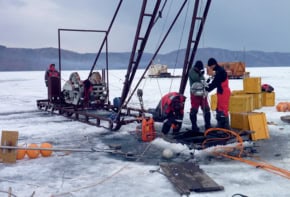
The number of physicists in the US Congress has risen to three after G. William “Bill” Foster, a veteran of the Fermilab National Accelerator Laboratory, won a by-election in Illinois on Saturday. Foster, a Democrat who has never previously stood for political office, secures a seat in the House of Representatives previously occupied by Republican and former House speaker Dennis Hastert, who resigned after 20 years service. “Back in the laboratory, this is what we’d say was a pretty successful experiment,” Foster said.
The two existing physicists in Congress are Republican Vernon Ehlers of Michigan, a nuclear physicist and one-time chair of Calvin College’s physics department, and Democrat Rush Holt of New Jersey, formerly assistant director of the Princeton Plasma Physics Laboratory.
Scientific training teaches you always to look at the facts first Bill Foster
Foster, 52, earned a bachelor’s degree in physics from the University of Wisconsin in 1975. Four years later, as a Ph.D. student at Harvard University, he joined the Irvine–Michigan–Brookhaven (IMB) collaboration where he helped to design, build, and conduct research the IMB detector. Designed to spot proton decay, this instrument gained fame when it detected a burst of neutrinos emitted by the SN 1987A supernova.
On earning his Ph.D. in 1984, Foster began what was to become a 22-year stint at Fermilab. As his first task, he designed and built components of the Tevatron’s CDF detector, which discovered the top quark in 1994. In the early 1990s, he led a team responsible for designing an integrated circuit that ratcheted up the speed and accuracy of measuring particle collisions. Later in that decade he co-invented Fermilab’s “recycler ring”. Foster left Fermilab two years ago to devote himself to political activism. However, because it lies within his constituency, he retains links to the lab.
Before he became a physicist, Foster had launched a successful business career. When he was 19, he and his younger brother Fred used $500 of their parents’ money to found a lighting company, Electronic Theatre Controls Incorporated, which now manufactures more than half the theatre lighting equipment used in the United States. The equipment has featured in Broadway, in Rolling Stones tours, and in half-time entertainment at the Superbowl. Foster used some of the fortune generated by the company to finance his election campaign.
His background in physics played its own critical role in his political success. “The scientific training teaches you always to look at the facts first,” he said in reference to the Iraq war. “If you look at the places this country’s gotten itself in trouble, it’s very often where we ignore facts for political reasons.”



